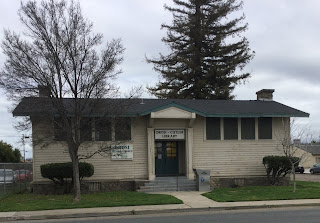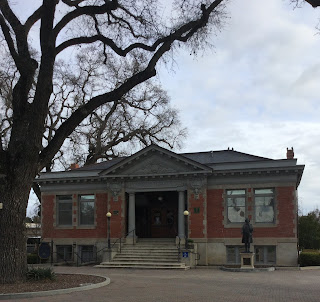But the rain came a couple of hours before I was ready to camp and came down so hard that all the orchards were rendered into lakes. I was as drenched as the ground, but had no choice but to continue, as there was no shelter for miles. When I came to the turn I planned to take south the road was blocked with a flooded sign. This one I didn’t care to defy, so I continued east towards the Sierras for a couple more miles before I could turn south.
All around the water was gathering. Camping was looking very very iffy. The rain did let up as I came upon a rural church, always a possibility for camping. The ground behind it wasn't overly saturated, but there was just a narrow band of grass on a slight hump beside a steep drop into a ravine. I ducked under an overhang and entered motel into my GPS. Two turned up in Reedley eight miles away. It was thirty minutes until sunset. I was soaked and really needed to dry out, so I elected to go for it. It was dark by the time I reached the outskirts of the town, but the city lights made it manageable.
Before I reached the first motel I passed Reedley College, explaining the presence of motels, which have not been that common except along the larger freeways and cities. I’ve become accustomed to motels wanting $70 for a room, but willing to drop it to $60. But not this one, though it was non-chain and Indian-owned. At least the owner said there was a cheaper one three stop lights away, and it wasn’t the other one that the GPS indicated. It was $50, but full.
I had biked nearly ninety miles for the day, but didn’t mind some more as it allowed me to dry my clothes now that it had stopped raining. The third was $70, but willing to take $60, and it included breakfast, which the first one didn’t. And it was a hearty breakfast of more than cereal and toast, as had been the case the two other times I have been forced into motels. It had one of those do-it-yourself waffle-makers that I always hope for. When morning came I gorged myself on two batches, which staved off the hunger knocks until mid-afternnon.
There was no missing Exeter’s distinguished Carnegie in the corner of a vast park. It was now the town’s senior center and called itself the Carnegie Community Building. It’s beauty was enhanced by a cluster of towering palm trees, a feature of many of the Carnegies of California. Downtown Exeter was scattered with murals large and small, the grandest of a huge orange orchard. The agriculture of the region was reflected by the names of some of the nearby towns—Orange City and Farmersville.
Thirty miles to the west the Carnegie in Hanford was a true stunner, designed in the spirit of libraries as temples. It is considered the best example of Romanesque architecture in the entire state other than a handful of buildings on the Stanford campus. It was an early Carnegie built in 1905, with “Hanford Free Public Library” on its facade. Despite its magnificence it was slated to be torn down in 1971 and turned into a parking lot three years after it had ceased to be the town library. That galvanized a huge effort to save it, with thousands of dollars raised and over 250,000 hours of volunteer labor to resurrect it as a historical museum. If any Carnegie deserves to be on the NRHP, this one certainly does and is.
The same could be said of the Carnegie in Paso Robles over one hundred miles away over a couple of long climbs out of the orchards and into cattle country back towards the coast. Before the vast almond orchards ran out, I was able to camp the night before in an orchard in full flower, the white buds on the trees and ground looking like snow.
The Paso Robles Carnegie sat majestically in the middle of the city’s central park, which it has all to itself. It now bears the identity of the Historical Society at the Carnegie Library. A statue of Ignacy Jan Paderewski, a renowned pianist who made Paso Robles his home from 1914 to 1939 before his death in 1941, stands in front. The town further honors him with an annual youth piano festival and competition.






4 comments:
George, if I'd known you'd be up in the orange orchards, I might've been able to get you a place to stop and camp/sleep indoors at my Father-in-Law's place, in Woodlake, just outside Visalia. Not sure if you got by close to there, though. But, if you're headed back that direction later, perhaps there'll be another chance. Safe travels!
Bill in KC
Bill: Woodlake was halfway between Orosi and Exeter. I could have easily dropped in on your father-in-law. It’s aways nice to get the local perspective from someone who has a connection with a friend. Sorry I won’t be going back that way.
George - My husband Brian and i are long time readers of your blog. We are on our own bike tour now - and we are so disappointed that we were not home to have hosted you at our home in Atascadero. We were watching your blog, but you moved South a lot faster than we expected. We will be driving back to California on March 11/12 - from Phoenix, AZ. Maybe we can meet you for lunch along the way.
Janet: I could be somewhere along the Salton Sea by the 11th or 12th on my way to the Carnegies in El Centro and Calexio near the Mexican border. Depends on whether I linger in LA more than a day or two. I’m due there on the 9th.
Post a Comment